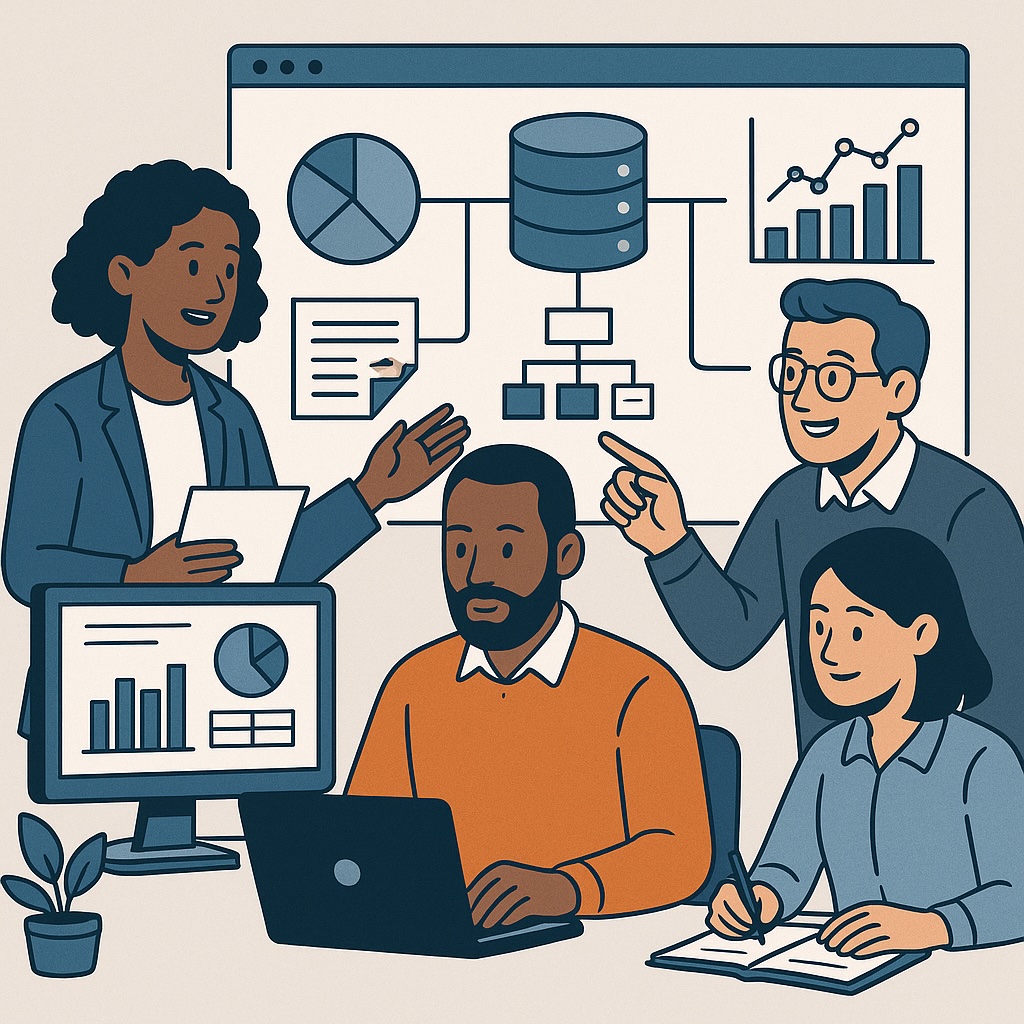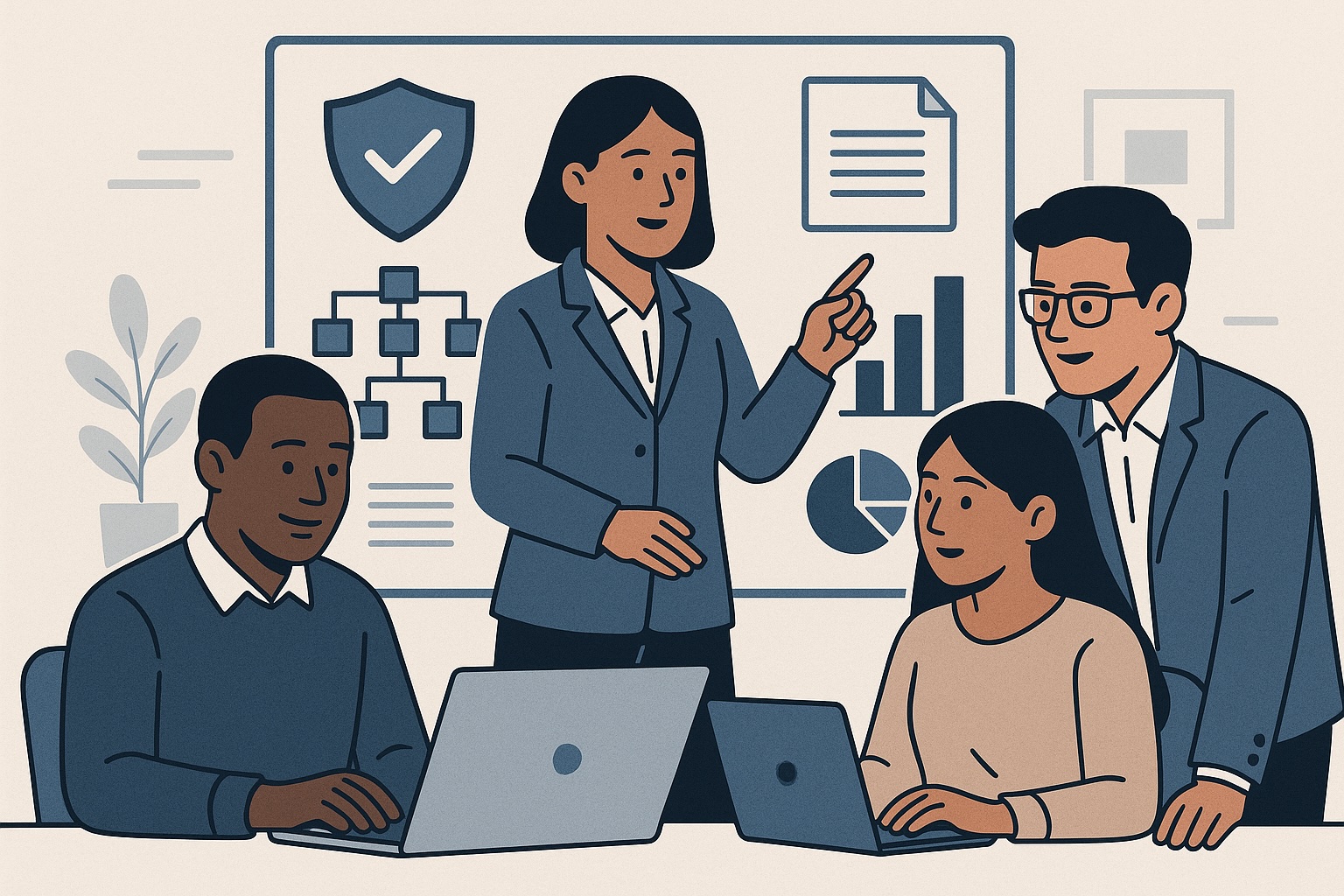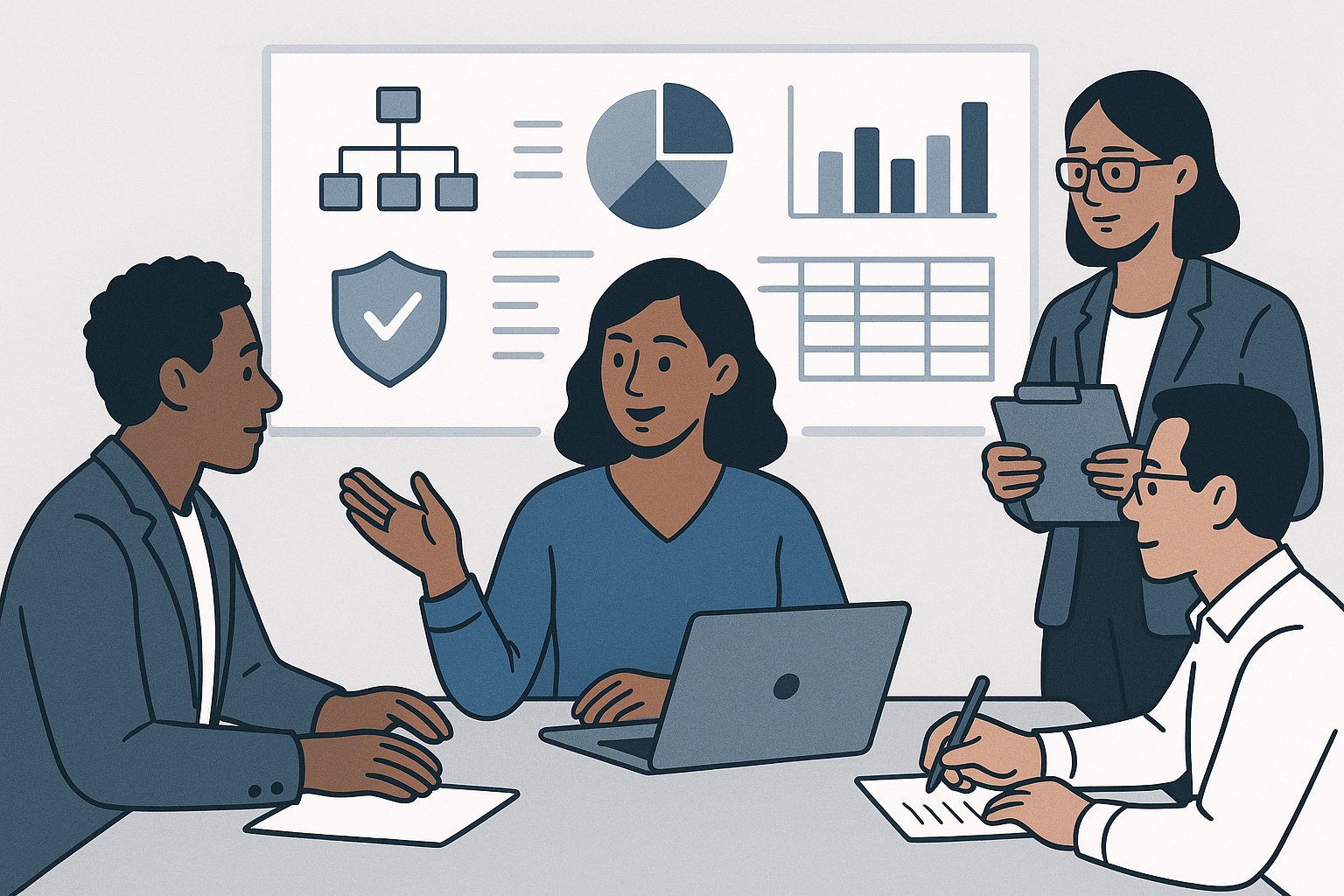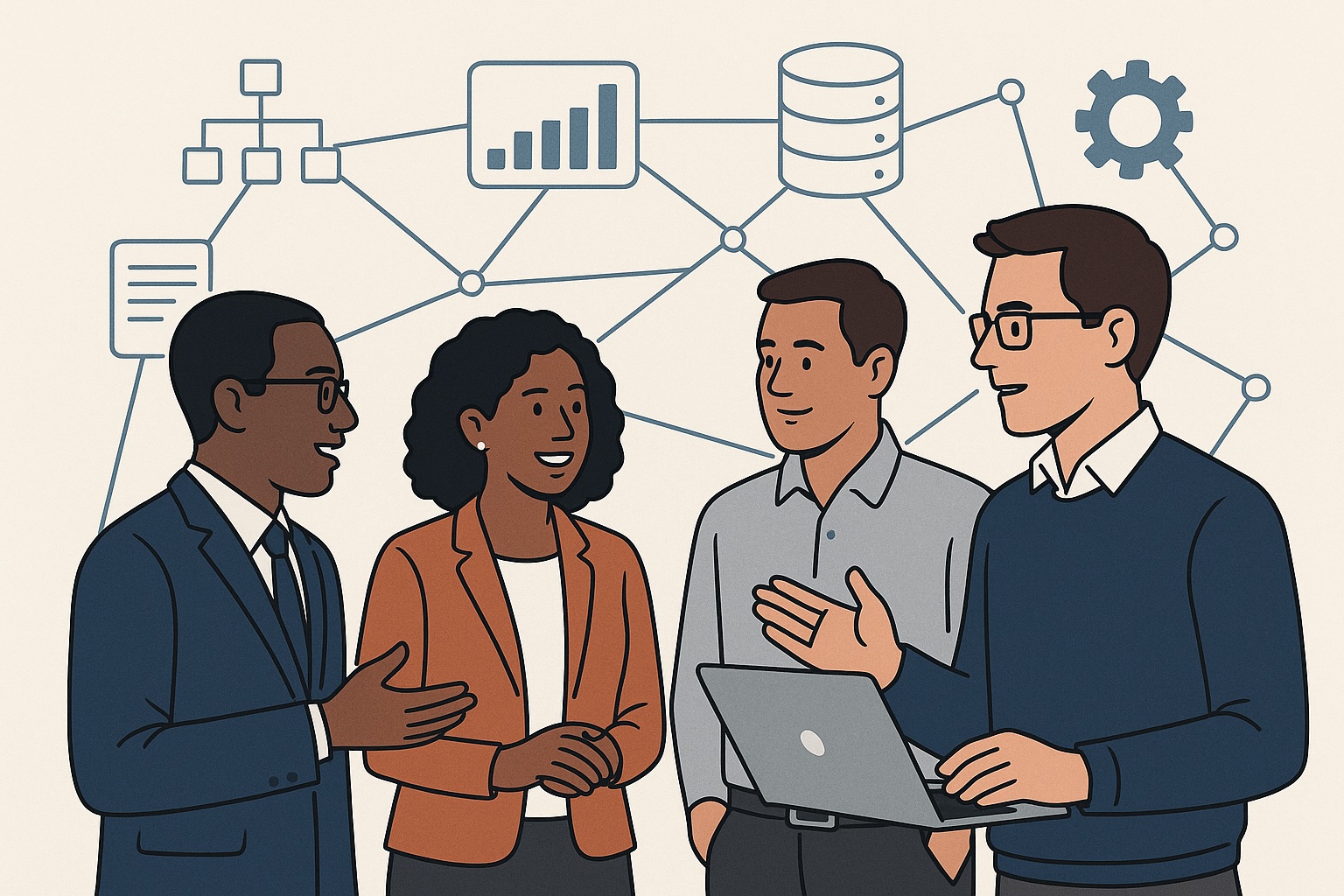What does a Data Governance Specialist do?
A Data Governance Specialist is responsible for structuring, managing, and securing data within an organization. In an era where data is considered strategic business capital, the role of this specialist is crucial. They ensure that data is reliable, accessible, and compliant with relevant laws and regulations. By creating clear frameworks and responsibilities, they support organizations in making data-driven decisions and mitigating risks.
What does a Data Governance Specialist do?
Data Governance Specialists work at the intersection of data, policy, and compliance. They act as the link between IT, data analysis, legal departments, and business units. Their goal is to ensure consistency, transparency, and control over all data assets within an organization.
Key tasks and responsibilities
- Developing, implementing, and updating data governance frameworks and guidelines.
- Coordinating data ownership and responsibilities across different teams.
- Establishing and managing processes for data stewardship and data quality management.
- Monitoring data flows and identifying and resolving data quality issues.
- Ensuring compliance with laws and regulations, such as the GDPR, related to data privacy and security.
- Managing metadata, data lineage, and data classification.
- Advising stakeholders on risks, optimization opportunities, and best practices in data management.
Competencies and skills
A successful Data Governance Specialist possesses analytical insight, a keen eye for detail, and excellent communication skills. Technical knowledge of data management systems, compliance, information standards, and data modeling is essential. Experience with tools such as Collibra, Informatica, or Microsoft Purview is often a plus.
Why is this role important?
In many organizations, the volume of data has grown exponentially. Without proper governance, there is a risk of data breaches, inconsistent reporting, fines, or inefficiencies. The Data Governance Specialist helps prevent this by providing structure and clearly defining responsibilities. As a result, organizations can better rely on their data, laying the foundation for effective data analysis, AI applications, and strategic decision-making.

Job Profile of a Data Governance Specialist
What Does a Data Governance Specialist Do?
A Data Governance Specialist plays a crucial role in ensuring the quality, integrity, security, and consistency of data within an organization. In an era where data has become one of the most valuable business assets, these specialists ensure that data is reliable and usable for strategic decision-making. They act as the bridge between technology, policy, and business processes, helping organizations remain compliant with internal standards and external regulations.
Typical Responsibilities
- Developing, implementing, and maintaining policies and procedures around data governance.
- Coordinating data quality initiatives and ensuring consistency of data across systems.
- Collaborating with IT, compliance, legal, and business stakeholders to establish uniform standards and guidelines.
- Supporting the setup of data stewardship programs and training colleagues in responsible data usage.
- Monitoring data infrastructure to proactively identify risks related to privacy, security, and integrity.
Desired Education and Background
- A relevant academic degree, such as computer science, business administration, information management, data science, or a related field.
- Proven experience in data analysis, data management, and applying data governance frameworks (such as DAMA-DMBOK or DCAM).
- Thorough knowledge of data protection laws and regulations, including the GDPR and national privacy legislation.
Key Skills
- Strong analytical and problem-solving skills to ensure data quality, accuracy, and reliability.
- Project management skills to successfully lead multidisciplinary data governance projects.
- Excellent communication skills to clearly convey policies, risks, and guidelines to both technical and non-technical stakeholders.
- Affinity with data tools such as Collibra, Informatica, Alation, Tableau, or Power BI is a plus.
Career Outlook
The demand for Data Governance Specialists continues to grow due to the increasing volume of data, stricter regulations, and the importance of data-driven operations. Organizations in sectors such as finance, healthcare, government, telecom, and retail are increasingly investing in data quality and management. A career as a Data Governance Specialist offers not only intellectual challenge but also excellent growth opportunities into roles such as Data Manager, Chief Data Officer, or Privacy Officer.

Which tools does a Data Governance Specialist use?
Data Cataloging Tools
Data cataloging tools form the foundation of a well-organized data landscape. They help inventory, classify, and make data accessible within the organization. Data Governance Specialists use these tools to create, manage, and enrich metadata, making it easier to find, understand, and responsibly use datasets.
Common tools include Alation, Atlan, and Informatica Enterprise Data Catalog. These platforms also support data lineage (the origin and flow of data), which is essential for transparency and compliance.
Data Quality Tools
High-quality data is essential for reliable decision-making. Data quality tools support the analysis, improvement, and monitoring of data quality. They detect and correct errors, inconsistencies, duplicates, and missing values.
Tools like Informatica Data Quality, Talend Data Quality, and IBM InfoSphere QualityStage offer automated validation rules and data profiling, allowing organizations to continuously maintain their data.
Data Protection and Privacy Tools
In an era where data privacy is crucial, security tools are indispensable for a Data Governance Specialist. These tools ensure compliance with laws and regulations such as GDPR, CCPA, and other privacy legislation. They assist in classifying sensitive data, monitoring access, and detecting data breaches.
Examples include IBM Guardium, Informatica Secure@Source, and Varonis Data Security Platform. These tools often offer extensive auditing capabilities and integrate with identity & access management systems.
Master Data Management (MDM) Tools
MDM tools provide a single, consistent source of truth within the organization. They enable centralization, harmonization, and synchronization of master data – such as customer, product, or supplier data – across multiple systems.
Well-known solutions include SAP Master Data Governance, Informatica MDM, and IBM InfoSphere Master Data Management. These tools help organizations avoid data silos and ensure data consistency across applications and departments.
Data Integration Tools
Data is often stored in different systems and formats. Data integration tools help collect, transform, and load this data (ETL/ELT) into a central data warehouse or data platform. For a Data Governance Specialist, these tools are important to gain insight into data flows and perform integrity checks.
Commonly used tools include Azure Data Factory, Talend, and Informatica PowerCenter. These tools support both batch processing and real-time data integration.
Business Intelligence (BI) Tools
BI tools enable organizations to turn data into actionable insights. They are used for data visualization, reporting, and dashboarding. For a Data Governance Specialist, these tools are relevant because they provide insight into data usage and value.
Popular BI platforms include Power BI, Tableau, and Looker. They allow for quick identification and sharing of trends, patterns, and anomalies in datasets with stakeholders.

A Day in the Life of a Data Governance Specialist
08:30 – Start of the workday: review and planning
The day begins with a cup of coffee and a review of the dashboard containing data quality reports. The first task is to check for any anomalies or incidents that may have occurred during overnight processing. The Data Governance Specialist identifies which datasets require attention, notes priorities, and creates a task list for the day.
09:30 – Meeting with data stewards and the IT department
In a daily meeting with data stewards and the IT department, the specialist discusses ongoing issues, such as incorrect data fields or unclear metadata. They discuss whether additional data cataloging is needed or if data quality rules should be adjusted. Together, they determine next steps and assign responsibilities.
10:30 – Working on policy documents and classification models
Next comes a focused work block: updating data access policies and refining classification models. The specialist works on guidelines that define which data is considered sensitive and who is allowed to access it. This is crucial for staying compliant with GDPR requirements and internal audit standards.
12:00 – Lunch break and informal catch-up
During lunch, there is often informal catch-up time with colleagues from compliance, security, or business intelligence. These moments are valuable for identifying where data governance support is needed or where risks may arise due to unclear policies.
13:00 – Training or workshop with departments
In the afternoon, the specialist often gives a short training or workshop to a department. Examples include sessions on "how to use the data catalog" or "best practices for data quality." These sessions aim to raise awareness and strengthen the organization's data culture.
14:30 – Audits and compliance checks
Next on the agenda is an internal audit. Together with a compliance officer, the Data Governance Specialist checks whether departments are adhering to data policies, whether there has been any unauthorized access, and whether sensitive data has been handled correctly. Findings are documented immediately.
15:30 – Incident analysis and problem-solving
An urgent incident is reported: an error has been detected in the customer master data. The specialist investigates the cause, determines which processes are affected, and coordinates the resolution with data engineers and application managers. The incident is then logged in the data quality register.
16:30 – Reporting and strategy
At the end of the day, the specialist works on a periodic report for management. This includes information on data quality, compliance, incidents, and progress on governance initiatives. Strategic advice is also provided, such as recommendations for new tool investments or adjustments to data processes.
17:30 – End of the workday: reflection and preparation
The workday ends with a brief reflection and preparation for tomorrow. What risks have been mitigated? What are the priorities for the next day? Due to the diverse nature of the role, each day remains challenging, with accuracy, communication, and collaboration at its core.

What does a Data Governance Specialist earn?
The salary of a Data Governance Specialist can vary significantly depending on factors such as experience, location, the type of organization (public or private), and expertise with specific data and governance tools. Data Governance Specialists play a crucial role in ensuring data quality, security, and policy compliance within organizations. They are essential for establishing policies and guidelines for effective data management. Below is an overview of salary expectations based on different experience levels.
Entry Level (Junior Data Governance Specialist)
A Junior Data Governance Specialist, often holding a bachelor’s or master’s degree in information management, data science, or business administration, typically earns €3,000 to €3,800 per month. At this level, they usually work under supervision on data classification, documentation, and support for data policy. They work with tools for metadata, data lineage, and quality control.
Mid-level (Data Governance Specialist)
A Data Governance Specialist with a few years of experience (typically 3 to 6 years) earns an average of €3,800 to €4,800 per month. Professionals at this level are responsible for drafting and implementing data policies, guiding data projects, and ensuring compliance (e.g., with GDPR or sector-specific regulations). They often work closely with data engineers, privacy officers, and compliance managers.
Senior Level (Senior Data Governance Specialist)
A Senior Data Governance Specialist with over 6 years of experience typically earns €4,800 to €6,000 per month. They play a leading role in strategic data initiatives, coach teams, assess data management maturity, and report to executive leadership or boards. Additionally, they are responsible for risk assessments, data standardization, and continuous improvement of data processes.
Lead / Principal Data Governance or Chief Data Steward
A Lead Data Governance Specialist or Chief Data Steward serves in a strategic or advisory role within larger organizations. Salaries are often between €6,000 and €7,500 per month. These roles include policy development, stakeholder management, and change management at the organizational level. They work with advanced tools for data lineage, data cataloging, and data quality, and are often involved in data architecture and governance boards.
Location and Sector
Location and sector significantly influence salary. In the Randstad region or at large financial institutions, insurance companies, telecom firms, or government ministries, salaries tend to be higher. In non-profit organizations or smaller public agencies, salaries are often slightly lower, but employment conditions may be more attractive due to extra vacation days or hybrid working arrangements.
Education and Skills
Data Governance Specialists often have a background in information management, business administration, IT, or data science. Key skills include knowledge of data quality, metadata, privacy legislation (such as GDPR), and experience with tools like Collibra, Alation, Informatica, or Microsoft Purview. In addition, soft skills such as analytical thinking, communication, and stakeholder management are essential for success in this role.
| Position Level | Experience | Monthly Salary (gross) |
|---|---|---|
| Junior Data Governance Specialist | 0–2 years | €3,000 – €3,800 |
| Data Governance Specialist (mid-level) | 3–6 years | €3,800 – €4,800 |
| Senior Data Governance Specialist | 6+ years | €4,800 – €6,000 |
| Lead / Chief Data Governance Specialist | Strategic / Leadership | €6,000 – €7,500 |

Career Path and Growth Opportunities as a Data Governance Specialist
Career Prospects of a Data Governance Specialist
A career as a Data Governance Specialist offers excellent growth opportunities in a rapidly evolving data landscape. As organizations become increasingly data-driven, the importance of proper data management and clear governance structures continues to rise. As a result, the demand for professionals with in-depth knowledge of data quality, compliance, and data security is growing.
Advancement Opportunities and Specializations
As you gain more experience and build your expertise, you can move into strategic and leadership roles. Examples include positions such as Data Governance Manager, Chief Data Officer, or Data Strategist. These roles not only focus on ensuring data quality but also on shaping the broader data strategy within the organization.
You can also specialize in a specific domain, depending on your interests and skills. Examples of such specializations include:
- Data Privacy: Focus on compliance with laws and regulations such as the GDPR.
- Information Security: Focus on protecting sensitive data and preventing data breaches.
- Data Quality: Work on improving, monitoring, and standardizing datasets.
- Data Architecture: Design and optimize the structure in which data is stored and used.
Horizontal Growth and Collaboration
Not all growth is vertical. Many Data Governance Specialists expand their role by working more closely with other disciplines, such as data engineering, business intelligence, or compliance. This allows you to increase your value within the organization and act as a bridge between IT, legal departments, and the business.
The Future of the Field
With the growing focus on ethical data usage, AI governance, and stricter regulations, the field continues to evolve. This presents opportunities to play a leading role in the transformation toward a data-driven organization. Pursuing relevant training and certifications (for example in data management or privacy legislation) increases your chances for advancement and specialization.

Training and Certification for Data Governance Specialists
To be successful as a Data Governance Specialist, it is essential to continuously invest in your knowledge, skills, and professional development. Data governance is a dynamic field in which new technologies, laws and regulations, and best practices evolve rapidly. A solid academic background—such as in information management, data science, IT, or law—provides a strong foundation. In addition, there are various courses and certifications available that deepen your expertise and enhance your competitive edge in the job market.
Data Governance Professional Certificate
This certification offers a solid foundation in the core principles of data governance. You will learn about data quality management, policies and guidelines, data stewardship, and the implementation of governance frameworks. The course is suitable for both entry-level and experienced professionals and aligns well with organizations aiming to work in a data-driven manner.
Certified Information Privacy Professional (CIPP)
This certification focuses on privacy regulations and data protection. You will develop in-depth knowledge of legislation such as the GDPR and learn how to apply privacy principles within governance processes. This knowledge is essential in sectors where personal data is processed, such as government, healthcare, and finance.
Certified Information Systems Security Professional (CISSP)
The CISSP certification is intended for professionals focusing on information security within their governance role. The course covers topics such as risk management, security architecture and engineering, and access control. This certification is valuable if you are working to secure sensitive or business-critical data.
Data Stewardship and Data Management Training
In addition to certifications, there are also practical trainings and courses in areas such as data stewardship, metadata management, and data classification. These trainings often focus on the operational execution of data governance and help you collaborate effectively with data owners, IT, compliance, and business units.
Continuous development and networking
To stay current in this rapidly evolving field, it is advisable to attend seminars, webinars, and professional conferences. Membership in professional networks or communities focused on data governance and data management can also help you gain up-to-date insights, share practical experiences, and expand your network.
By completing courses and earning recognized certifications, you demonstrate that you possess the knowledge and competencies required to play a key role as a Data Governance Specialist. In doing so, you actively contribute to improving the quality, integrity, security, and compliance of data within organizations.

Networking and Industry Associations
Industry Organizations and Networks
For Data Governance Specialists, it is essential to stay actively involved in the broader data and information management community. Membership in industry organizations provides access to up-to-date knowledge, guidelines, and valuable networking opportunities. Think of organizations such as the Data Governance Institute, the Data Management Association (DAMA), and the Information Systems Audit and Control Association (ISACA). These associations regularly organize events, seminars, and webinars focused on current topics such as data quality, compliance, privacy legislation, and metadata management.
By actively participating in such networks, you stay informed about the latest trends, regulations, and best practices in the field. Additionally, it offers opportunities to exchange experiences with peers, discuss real-world examples, and gain insights from other sectors. This not only contributes to your professional development but also increases your visibility in the field and enhances your chances of exciting career opportunities.
Networking at Conferences and Events
Physical and digital conferences are valuable opportunities to expand your network and connect directly with other specialists, policymakers, and technology partners. Whether it’s small-scale knowledge sessions or international congresses, these gatherings provide space for in-depth learning, collaboration, and inspiration. Actively attending talks or speaking at events also positions you as an expert in your field.
Online Networking and Communities
In addition to physical networking moments, there are countless digital platforms where Data Governance Specialists can engage in knowledge sharing and connect with peers. LinkedIn groups, specialized Slack and Discord channels, and forums offer accessible ways to discuss current topics, technical challenges, and new tools.
Active participation in these online communities helps build a strong professional profile. By sharing knowledge and experiences, you can position yourself as a thought leader and increase your visibility in the field. Moreover, these networks often lead to collaborations, freelance assignments, or career opportunities that might otherwise go unnoticed.
Conclusion
Investing in your professional network and staying actively involved with industry organizations is crucial for anyone serious about a career in data governance. It opens the door to new insights, valuable connections, and concrete growth opportunities. Both offline and online, there are plenty of opportunities to develop yourself and be visible in this rapidly evolving field.

Impact and Social Relevance
The Societal Relevance of a Data Governance Specialist
A Data Governance Specialist plays a key role in our increasingly data-driven society. As organizations in both the public and private sectors collect, process, and analyze vast amounts of data on a daily basis, ensuring the integrity, availability, quality, and security of data becomes ever more crucial. This specialist ensures that data is reliable, up-to-date, and usable – essential for well-informed decision-making.
Impact on Organizations
The impact of a Data Governance Specialist is immediately noticeable within organizations. By establishing clear guidelines for data quality, ownership, classification, and access, they help prevent errors, duplication, or data silos. Poorly managed data can lead to inefficiency, compliance issues, or even reputational damage. An effective data governance policy enables organizations to operate more strategically, accelerate innovation, and reduce risks.
Contribution to Society
The role of a Data Governance Specialist is also of great value at a societal level. In sectors such as healthcare, education, government, and finance, they contribute to transparency, responsible data use, and privacy protection. Especially in times of growing distrust toward data collection and AI applications, it is important that citizens can trust that data is handled ethically and with care.
Trust, Compliance, and Ethics
Data Governance Specialists operate at the intersection of technology, policy, and ethics. They are responsible for ensuring compliance with laws and regulations such as the GDPR and other privacy frameworks. They identify risks, assess data flows, and develop policies that align with both business objectives and societal values. This role actively contributes to strengthening public trust in digital services and technological progress.
Future-Proof Role
With the rise of AI, machine learning, and advanced data analytics, the demand for clear data governance is growing. Organizations are increasingly realizing that without reliable and well-managed data, even the most advanced technologies will fail. The Data Governance Specialist is therefore an indispensable link in the sustainable and responsible use of data, now and in the future.

Case Study: The Role of Data Governance Specialist at XYZ Corp.
Introduction: a Fragmented Data Landscape
At XYZ Corp., an international technology company with offices around the globe, awareness grew that their data landscape had become unbalanced. Data was scattered across multiple systems, departments used different standards, and there were no clear agreements on data quality or ownership. This led to delays in reporting, unreliable dashboards, and compliance risks. To regain control over their data assets, management decided to appoint an experienced Data Governance Specialist.
First Steps: Analysis and Awareness
The specialist began with a thorough analysis of the current situation. Through discussions with stakeholders from IT, finance, marketing, and operations, he mapped out the pain points. He found there was significant confusion over who was responsible for which data, and no central guidelines existed for creating, modifying, or storing data. One of the first actions was launching an awareness campaign about the importance of data quality and governance.
Responsibilities and Structure
Based on his analysis, the specialist designed a clear Data Governance Framework consisting of policies, roles, and responsibilities. He introduced the roles of data owners and data stewards within each department. Every data field was assigned an "owner" responsible for its quality and currency. Procedures were also established for data entry, validation, storage, and access, fully aligned with applicable laws and regulations such as the GDPR.
Action & Implementation: From Fragmentation to Consistency
With the help of specialized tools, a data inventory was carried out: what data flows exist, where are they located, how are they used, and by whom? The specialist discovered dozens of duplicates and contradictions in customer data, products, and reports. In collaboration with IT and functional teams, a centralized data platform was then set up, integrating all business data in a uniform manner. Additionally, data quality rules and dashboards were implemented to gain real-time insights into anomalies and trends.
Collaboration as the Key to Success
Crucial to the successful implementation of data governance was the ongoing collaboration with internal stakeholders. The specialist acted as a bridge between technology and business. Through training sessions, workshops, and practical tools, he ensured that employees themselves recognized the value and necessity of data governance. This led to broad support and a cultural shift in which data quality became a shared responsibility.
Results: Better Data, Better Decisions
After twelve months, the impact was clearly visible: XYZ Corp. now had standardized processes for data management, with clear ownership, reliable datasets, and well-regulated access. Reports became more consistent, decisions could be made faster and with more confidence, and compliance and data breach risks had significantly decreased. These improvements also increased the trust of customers and regulators in the organization.
Conclusion
The appointment of a Data Governance Specialist proved essential for professionalizing XYZ Corp.'s data structure. Through a combination of strategic insight, technical knowledge, and interpersonal skills, he transformed a fragmented data landscape into a solid foundation for data-driven work. His efforts contribute daily to better decision-making, innovation, and sustainable success.

Looking for a Data Governance Specialist?
For a small fee, you can easily post your job openings on our platform and reach our large, relevant network of data and analytics specialists. Applicants respond directly to you, without third-party involvement.
On DataJobs.nl, we bring together supply and demand in the data and analytics job market—without intermediaries. You won’t find job listings from recruitment agencies here. Visitors can view all vacancies for free and without an account, and apply directly.
Explore the options for posting vacancies here. Questions? Contact us!

Op zoek naar een uitdaging in data & analytics?
Bekijk hier alle actuele kansen! See vacancies- What does a Data Governance Specialist do?
- Job Profile of a Data Governance Specialist
- Which tools does a Data Governance Specialist use?
- A Day in the Life of a Data Governance Specialist
- What does a Data Governance Specialist earn?
- Career Path and Growth Opportunities as a Data Governance Specialist
- Training and Certification for Data Governance Specialists
- Networking and Industry Associations
- Impact and Social Relevance
- Case Study: The Role of Data Governance Specialist at XYZ Corp.
- Vacancies for Data Governance Specialists
- Looking for a Data Governance Specialist?



